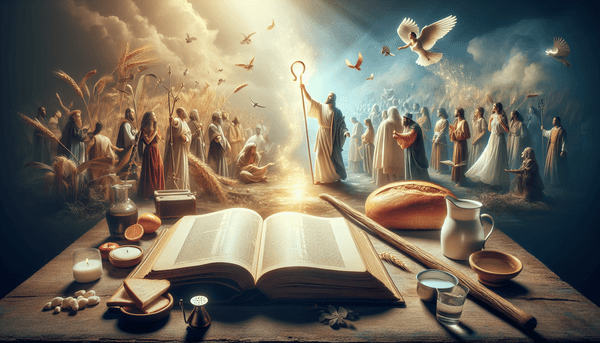David and Goliath: Trusting God in the Face of Adversity
The story of David and Goliath is a testament to the victory of faith over fear. When David faced the giant Goliath, he did not rely on conventional weapons or armor; instead, he trusted in God's strength. David's faith, symbolized by his sling and stone, reminds us that with God, even the most humble tools can become instruments of divine power. As it is written in 1 Samuel 17:45-47, David declared that the battle is the Lord's, and He will give victory to His people. This account affirms that, like David, we can face our own 'giants' with confidence, knowing that, as Romans 8:31 states, if God is for us, who can be against us?
Be Strong and Courageous: Finding Strength in God's Presence
Throughout the Bible, we are urged to 'be strong and courageous' and not to succumb to fear. This call to fortitude is anchored in the assurance of God's unwavering presence. As Deuteronomy 31:6 emphasizes, He will never leave us nor forsake us. This divine companionship provides the foundation for our courage, enabling us to face life's challenges with confidence. The lives of biblical figures such as Joshua, who was commanded in Joshua 1:9 to be strong and courageous, exemplify the transformation that occurs when we lean into God's strength, allowing us to do all things, just as Philippians 4:13 promises, through Christ who strengthens us.
Fasting and Devotion: The Spiritual Discipline of Surrender
While the Bible does not prescribe fasting on specific days, it does emphasize the spiritual discipline's significance. Fasting is more than abstaining from food; it's an act of worship and surrender to God, aligning our physical hunger with our hunger for righteousness. As we read in Isaiah 58:6-7, true fasting is linked to acts of kindness and justice. In the New Testament, Matthew 6:16-18 instructs us to fast with a humble heart, seeking God's presence rather than the approval of others. Fasting, coupled with prayer as suggested in 1 Corinthians 7:5, becomes a powerful practice of devotion, deepening our relationship with the divine. For a more comprehensive exploration of spiritual disciplines like fasting within the Protestant tradition, consider reading our article on embracing spiritual disciplines.
The Shepherd's Call: Leadership and Care in Biblical Perspective
In the Bible, the role of a shepherd goes beyond mere animal husbandry; it is a metaphor for guidance, provision, and protection. God Himself is depicted as a shepherd, as in the comforting words of Psalm 23, which describe His care and leadership. Jesus Christ is also referred to as the Good Shepherd in John 10:11, highlighting His commitment to lay down His life for His flock. The responsibility of shepherds in the biblical sense extends to spiritual leaders today, who are called to emulate the same care and guidance for their communities, following the example of the Great Shepherd, Jesus.
The Power of Prayer and God's Word: A Light in the Darkness
As we navigate life's complexities, prayer and God's Word stand as pillars of light and comfort. Scripture, described as a lamp to our feet in Psalm 119:105, offers guidance and assurance. Prayer, the intimate communication with the divine, is a source of strength and peace, as illustrated in Philippians 4:6-7. This verse encourages us to present our requests to God, with the promise of a peace that transcends understanding. Together, prayer and the Word of God form a dual refuge for believers, allowing us to draw near to God with sincere hearts.
Conclusion
In exploring these themes, we've touched upon the core aspects of faith that resonate throughout the Bible's narrative. From the courage of David to the intimate act of prayer, the Scriptures provide a foundation for understanding the depth of our relationship with God. By embracing these teachings, we are encouraged to face the challenges of life with faith, to find solace in God's presence, and to seek His guidance through prayer and His Word. May these reflections inspire us to continue on our spiritual paths, fortified by the wisdom of the Bible and the knowledge that with God, all things are possible.
FAQ
Q: Is fasting on Sunday prescribed in the Bible?
A: Fasting on Sunday is not specifically mentioned in the Bible. While Sunday is traditionally a day of worship and rest in many Christian practices, there is no direct scriptural command to fast on this day.
Q: What is the significance of David killing Goliath?
A: The story of David and Goliath is a well-known account in the Bible, illustrating how God can empower the weak to overcome seemingly insurmountable obstacles. It is a story of faith, courage, and divine intervention.
Q: What does the Bible say about being strong and courageous?
A: The Bible frequently calls believers to be strong and courageous. Deuteronomy 31:6, for example, encourages us not to fear because God is always with us and will never abandon us. This theme is echoed throughout Scripture, reminding us of God's faithful presence.
Q: What does the Bible say about shepherds?
A: In the Bible, shepherds are figures who care for their flocks, often used as metaphors for God's care and guidance of His people. Jesus is described as the Good Shepherd in the New Testament, emphasizing His protective and nurturing role for His followers.






